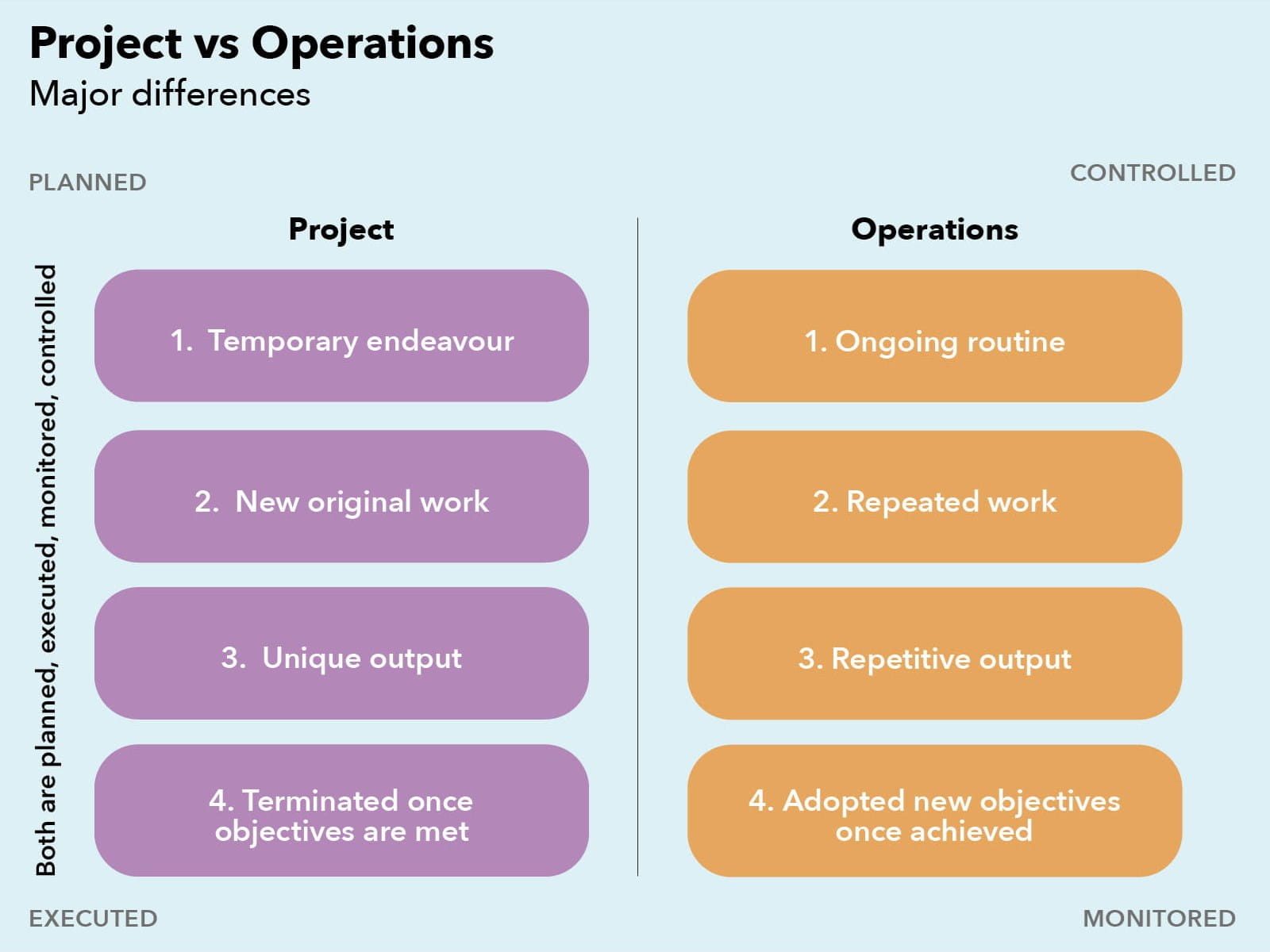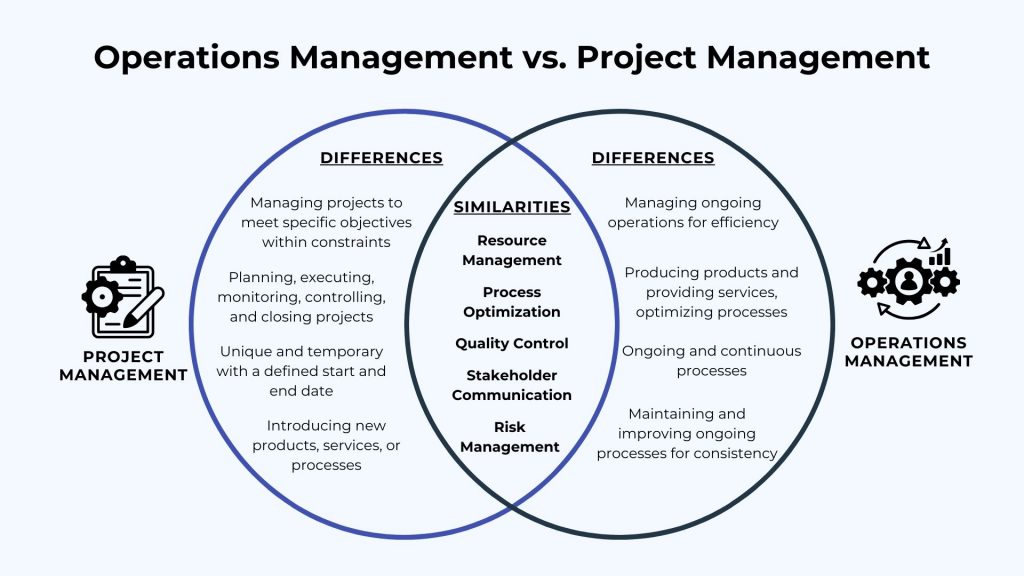Have you ever wondered about the difference between project management and operations management? These two terms often pop up in business discussions, but they can seem like they’re speaking a different language.
Understanding the difference is crucial for anyone looking to streamline their business or improve their career. Imagine having the power to boost productivity, maximize efficiency, and enhance your skills by knowing exactly when to apply project management strategies versus operations management techniques.
This article will unravel the mystery behind these two vital concepts. You’ll discover how each plays a unique role in achieving your goals and driving success. By the end of this read, you’ll be equipped with the knowledge to make informed decisions that can transform the way you manage tasks, whether they’re temporary projects or ongoing operations. Dive in and unlock the secrets to managing your work life more effectively!

Credit: www.researchgate.net
Project Management Basics
Project management is crucial in achieving organizational goals. It involves planning, executing, and overseeing projects to meet specific objectives. Understanding its basics is key to differentiate it from operations management. With project management, each task has a unique purpose and lifecycle. Let’s delve deeper into its fundamental aspects.
Definition And Purpose
Project management is about organizing tasks to achieve specific goals. It focuses on temporary endeavors with defined scopes and timelines. The purpose is to complete projects efficiently and effectively. Managers aim to deliver results within budget and on time.
Key Characteristics
Projects are unique and temporary. They have clear objectives and constraints. Resources are allocated based on project needs. Flexibility and adaptability are crucial. Managers must respond to changing conditions and requirements.
Lifecycle Stages
Project management involves distinct stages. Initiation starts the project and defines its goals. Planning outlines tasks, schedules, and resources. Execution involves carrying out the plan and monitoring progress. Closure marks the project’s end, ensuring all objectives are met. Each stage requires specific skills and strategies.

Credit: www.icaew.com
Operations Management Essentials
Understanding operations management is vital for any business. It ensures that everything runs smoothly. This involves creating efficient systems and processes. Operations management focuses on the daily activities needed for production. Let’s explore its essentials.
Definition And Purpose
Operations management focuses on the efficiency of daily activities. Its purpose is to turn resources into goods or services. Managers oversee processes to meet customer demands. This involves planning, organizing, and supervising production. The goal is to maximize productivity and minimize costs.
Core Characteristics
Operations management is continuous and focuses on routine tasks. It involves managing both human and material resources. Efficiency and consistency are key characteristics. It requires a deep understanding of processes and workflows. Managers must also ensure quality control and process improvement.
Ongoing Processes
Operations management deals with repetitive tasks. These tasks occur daily, weekly, or monthly. It involves managing inventory, scheduling, and quality assurance. Managers must adapt to changes in demand and supply. This ensures that operations remain efficient and cost-effective.
Key Differences
Project management and operations management serve distinct roles in businesses. Understanding their key differences helps in selecting the right strategy for your needs. Project management focuses on achieving specific goals within a set timeframe. Operations management aims to maintain and optimize ongoing processes. Both have unique approaches and methodologies.
Timeframe And Duration
Projects have a defined start and end date. They are temporary and specific. Operations are continuous and ongoing, without a set end date. They handle daily activities and ensure smooth functioning.
Goals And Objectives
Project management targets specific goals or deliverables. It focuses on achieving these within the project’s timeframe. Operations management prioritizes efficiency and productivity. It ensures processes run smoothly and meet organizational goals.
Change And Adaptability
Projects often require flexibility. They adapt to changes and unexpected challenges. Operations focus on stability and consistency. They aim to minimize disruptions and maintain routine processes.
Roles And Responsibilities
Project management and operations management are crucial in any organization. They ensure smooth workflow and achievement of goals. Each role has unique responsibilities, contributing to the overall success. Understanding these roles helps in appreciating their significance in business. Let’s explore the specific roles and responsibilities of project managers and operations managers.
Project Manager
A project manager leads a team to achieve specific goals. They plan, execute, and close projects. Managing timelines and budgets is crucial. They ensure resources are used efficiently. Project managers also handle risks and changes. They keep stakeholders informed and satisfied. Their role ends when the project is completed.
Operations Manager
An operations manager focuses on daily activities. They ensure business processes run smoothly. Monitoring performance is a key duty. They strive for efficiency and quality. Operations managers manage resources across the organization. They also implement policies and procedures. Their role is ongoing, unlike project managers.
Tools And Techniques
Understanding the difference between project management and operations management is crucial for efficient business processes. Project management focuses on temporary tasks with specific goals and timelines. Operations management, however, deals with ongoing activities aimed at maintaining and improving everyday business functions.
In the world of business, project management and operations management often require different tools and techniques. Understanding these differences can enhance your efficiency and productivity. By selecting the right tools, you can streamline processes and achieve your goals more effectively.
Project Management Tools
Project management tools are designed to help plan, execute, and track projects from start to finish. Tools like Asana, Trello, and Microsoft Project are popular choices. They enable you to create tasks, set deadlines, and monitor progress in real-time.
Using these tools, you can assign tasks to team members and track their completion. Have you ever tried visualizing your project timeline with a Gantt chart? It’s a great way to see what needs to be done and when.
Collaboration is key in project management. Tools like Slack and Microsoft Teams facilitate communication among team members, making it easy to share updates and feedback instantly.
Operations Management Tools
Operations management focuses on continuous processes, often utilizing different sets of tools. ERP systems like SAP and Oracle are crucial in managing day-to-day operations. They help with resource planning, inventory management, and supply chain operations.
Unlike project management tools, which are often more flexible, operations management tools are designed to optimize ongoing activities. Have you considered how optimizing inventory can impact your bottom line? With tools like QuickBooks, you can maintain accurate inventory levels and reduce waste.
Data analytics tools are also essential in operations management. Software like Tableau and Power BI can help you analyze performance metrics and make informed decisions. These tools provide insights into operational efficiency, helping you identify areas for improvement.
In choosing between these tools, think about your specific needs. Are you managing a one-time project or overseeing continuous operations? Your answer will guide you in selecting the right tools to enhance your workflow.
Impact On Organizational Success
Understanding the difference between project management and operations management is crucial for organizational success. Both play distinct roles but share the common goal of driving your business forward. How do these two components contribute to the overall success of your organization?
Project Contributions
Projects are temporary and unique, often aimed at bringing about change or creating something new. They require careful planning and execution to meet specific objectives. Consider a project to launch a new product. It involves various tasks like market research, design, testing, and marketing.
Successful project management ensures that these tasks are completed on time, within budget, and to the required quality standards. A well-executed project can lead to increased sales, improved brand reputation, and competitive advantage. It’s about creating value and delivering innovative solutions that can transform your business landscape.
Operations Contributions
Operations management focuses on the ongoing activities that keep your business running smoothly. Think of operations as the engine room of your organization, ensuring efficiency in production, logistics, and customer service. It’s the backbone that supports daily functions and maintains stability.
Imagine the smooth processing of customer orders or the efficient handling of supply chains. Operations management ensures that resources are used effectively, costs are controlled, and quality is maintained. This consistency is vital for customer satisfaction and long-term profitability.
Both project and operations management have unique impacts on organizational success. Projects bring innovation, while operations maintain stability. How do you balance these aspects in your business to ensure optimal growth and efficiency?
Interdependence And Collaboration
In the world of business, project management and operations management often overlap. Yet, each has distinct roles. They rely on each other to achieve goals. Collaboration is key to success. Understanding their interdependence enhances efficiency and productivity. Projects bring change, while operations maintain stability. Both need integration and communication to function smoothly.
Integration Strategies
Effective integration strategies align project goals with operational needs. This ensures smooth transitions and minimizes disruptions. Shared resources help achieve common objectives. Joint planning sessions foster collaboration. Regular meetings between managers encourage alignment. This promotes a unified direction for the organization.
Communication Channels
Clear communication channels bridge project and operations teams. They ensure everyone is on the same page. Email updates keep teams informed. Instant messaging allows quick resolutions. Face-to-face meetings build trust and understanding. Open dialogue fosters a culture of cooperation. This leads to better decision-making and problem-solving.

Credit: m.youtube.com
Frequently Asked Questions
What Is The Main Difference Between Project Management And Operations Management?
Project management focuses on achieving specific goals within a set timeframe. Operations management ensures ongoing processes run efficiently. Projects are temporary, while operations are continuous. Project managers handle unique tasks, whereas operations managers oversee routine activities. Both aim to enhance organizational performance.
What Is The Difference Between Om And Pm?
OM refers to Operations Management, focusing on efficient business processes and resource utilization. PM stands for Project Management, emphasizing planning, executing, and closing projects. OM ensures day-to-day operations run smoothly, while PM manages specific projects with defined goals and timelines.
Both are crucial for organizational success.
What Is The Difference Between Operations And Project?
Operations involve ongoing, repetitive tasks maintaining business functions. Projects are temporary, unique endeavors achieving specific goals. Operations ensure stability and efficiency, while projects drive change and innovation. Both require resources but differ in duration, objectives, and outcomes. Understanding these distinctions helps in effective management and goal achievement.
Does An Operations Manager Do Project Management?
Yes, an operations manager often handles project management tasks. They oversee planning, execution, and completion of projects. Their role includes coordinating resources, managing budgets, and ensuring deadlines are met. They align projects with business goals, focusing on efficiency and productivity.
Operations managers ensure projects run smoothly and meet organizational objectives.
Conclusion
Project management and operations management serve distinct roles. Projects have a clear start and end. Operations are ongoing and routine. Both require unique skills and approaches. Understanding these differences helps in choosing the right career path. It aids businesses in assigning tasks effectively.
Project managers focus on temporary goals. Operations managers maintain daily activities smoothly. Each role is crucial for business success. Knowing their differences enhances team collaboration. It leads to better resource management. Both fields complement each other in achieving company objectives.
Awareness of their unique functions boosts overall productivity.

